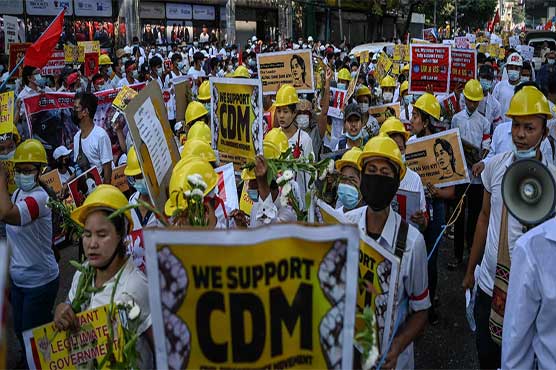Myanmar generals under renewed pressure after G7 condemnation, sanctions

World's wealthiest nations condemned junta for responding to anti-coup demonstrators "with violence"
YANGON (AFP) - Myanmar s military leaders came under renewed pressure Tuesday as the world s wealthiest nations condemned the junta for responding to anti-coup demonstrators "with violence", while Indonesia angled for a peace-broker role.
Authorities have gradually ratcheted up their use of force against a massive and largely peaceful civil disobedience campaign demanding the return of ousted leader Aung San Suu Kyi.
Late on Tuesday, Myanmar s ministry of Transportation confirmed Indonesian Foreign Minister Retno Marsudi will arrive in the capital Naypyidaw on Thursday for a day of talks.
She will be the first foreign envoy to touch down in the country since the February 1 coup. Indonesia has been proactive in lobbying neighbouring countries to help mediate the crisis through the Association of Southeast Asian Nations.
United Nations special envoy to Myanmar Christine Schraner Burgener is also hoping to visit the country soon.
"They say I am always welcome but for the moment you cannot come so it s a yes but not yet," she told France 24 ahead of a special UN General Assembly meeting on Myanmar scheduled Friday.
Three anti-coup protesters have been killed in demonstrations so far, while a man patrolling his Yangon neighbourhood against night arrests was also shot dead on the weekend.
"Use of live ammunition against unarmed people is unacceptable," the foreign ministers of the G7 group of rich democracies -- comprising Canada, France, Germany, Italy, Japan, Britain, and the United States together with the EU -- said in a statement Tuesday.
"Anyone responding to peaceful protests with violence must be held to account," they said, calling for Myanmar security forces to "exercise utmost restraint and respect human rights and international law".
The sharp condemnation comes after the overnight blacklisting of another two members of the regime by the United States -- air force chief Maung Maung Kyaw and fellow junta member Moe Myint Tun -- after Washington announced targeted sanctions against other top generals earlier this month.
Hours earlier, the European Union also approved sanctions targeting Myanmar s military and their economic interests, with EU foreign policy chief Josep Borrell saying financial support to government reform programmes was being "withheld".
Protesters continued staging rallies across Myanmar, though commercial hub Yangon saw much smaller numbers massing at key junctions on Tuesday, holding impromptu concerts.
"The military has always won using weapons and I don t like that at all," said protester Chan Mya. "We hate that and we ll keep protesting and expressing what we feel in peaceful ways."
In the northern Kachin state city of Myitkyina -- which has seen bursts of violence from authorities -- protesters rode their motorbikes across town waving the Myanmar flag and flashing a three-finger salute, a symbol of resistance.
Mandalay saw a more sombre crowd at the funeral of Thet Naing Win, a 37-year-old man shot and killed Saturday when security forces opened fire into a crowd of anti-coup protesters.
"I beg for all to help see that my husband s case is ruled with justice," said his widow Thidar Hnin, adding that she wants to see "the dictator dethroned".
"This country is owned by the citizens," she told AFP.
- Hundreds arrested -
Since the February 1 coup, a total of 696 people have been arrested, according to the Assistance Association for Political Prisoners monitoring group, with nearly all still behind bars.
Overnight internet shutdowns have also become routine, fanning fears of anti-coup protester arrests during the blackouts.
In recent weeks, the Myanmar military has deployed tear gas, water cannon and rubber bullets against protesters, with isolated incidents of the use of live rounds.
They have also stepped up the presence of security forces in Yangon, Myanmar s largest city.
The crackdown has failed to quell weeks of massive street demonstrations, joined by large numbers of striking civil servants, bank staff and healthcare workers.
Tens of thousands rallied on Monday in Naypyidaw, a military stronghold. More than 100 people were arrested as police chased protesters through the streets.
According to the Naypyidaw Justice Centre, a legal aid centre, they helped secure the release of about 20 protesters by Tuesday. It remains unclear how many are still behind bars.
The civil servants boycott has choked many government operations, as well as businesses and banks, and at the weekend the junta gave its most ominous warning yet that its patience was wearing thin.
"Protesters are now inciting the people, especially emotional teenagers and youths, to a confrontation path where they will suffer the loss of life," said a message aired on state media.
Suu Kyi has not been seen since she was detained in a dawn raid and has been hit with two charges by the junta, one of them for possessing unregistered walkie-talkies.
Her hearing is expected on March 1.

